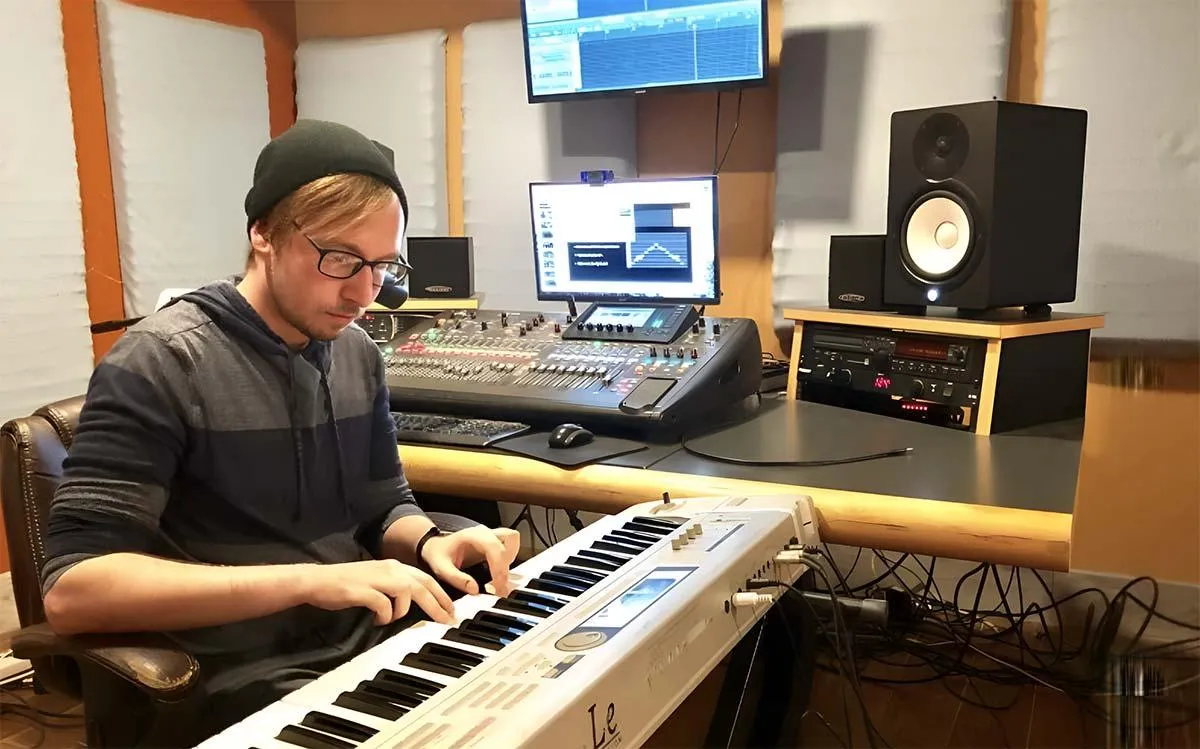Lil' Drummaboy Recordings' Blog
25 Years of Excellence
The Big Picture: How This Music Producer Found His Niche in Film Scoring
by Ashley Stanley | Jan 20, 2025

When you love music like we do, there is always that one song that makes you imagine how it feels to be the one who wrote it. You watch your favorite artist on stage and for a moment, picture yourself up there moving that crowd. Those among us with any sense of reality know that this is merely fantasy. And then there are those of us who are just crazy enough to try.
Lil’ Drummaboy Recordings Audio Engineering and Music Production School graduate, Paul Talos’ start was no different. The 27-year-old Boston native knew early on that he wanted a career in music. The challenge then was to find where he fit in this multi-billion dollar industry.
“Of course everybody when they start wants to be a touring musician,” he says, “putting out a record, touring the world, that kinda thing.”
For many artists, touring the country is still a dream. But for a 19-year-old Paul, going on tour with a band meant, “…being crammed in a van with a bunch of other dudes just traveling the country, not knowing how much you’re going to make as far as money, not knowing how you’re going to eat, that kind of stuff,” he explains, “I really didn’t care for that kind of lifestyle.”
He continued his journey at the renowned Berklee College of Music where he studied Guitar Performance. In 2013, however, his rigorous practice schedule would lead to a hand injury that brought his guitar-playing to a complete stop.
The young artist had been composing music for years already, but it wasn’t until the injury that he made a definitive shift from music performance to music production. Trading in his guitar for analog synthesizers and a DAW (Digital Audio Workstation), Talos began to explore the world of electronic music from his computer.
Finding Your Unique Sound
Paul’s experimentation with digital music creation lead him down a path of unconventional vibes the young producer couldn’t quite find a home for.
“I was making a lot of ambient stuff,” says Talos, “Really experimental, sound-design-heavy music,” that wasn’t bound to the confines of a structured arrangement like your typical pop song. He could hear there was something unique about his craft; he just had to find a home for it.
After seeing the critically-acclaimed film, The Social Network, Paul could imagine for the first time the possibility of a future in the music he was making.
“[The Social Network] influenced me a lot,” he says, “especially when I found out they won an Oscar for that score, which was entirely electronic…I think that opened the door for electronic producers that were always told they couldn’t be film composers.”
By 2015, Talos opened a commercial studio which he ran as a “side hustle,” as he calls it, while working a day job at a music store to make ends meet.
“It was a lot of long hours dealing with prima donna vocalists,” he shares of his less-than-glamorous studio career, “I just found it to be really tedious and it wasn’t bringing in the type of money that I was hoping for.”
How to Monetize The Music
Paul ran his studio for 3 years in New Haven, Connecticut before finally moving his business and life to an apartment in Philadelphia—a move he made to be closer to family.
It was only a month later when Paul found Lil’ Drummaboy Recordings (LDB) on his way from purchasing cables at a South Street music store. He came to LDB looking to “fill in some holes [in his audio production education],” promptly enrolling in the studio’s Dual Audio Engineering and Music Production Program.
Beginning with the very basics of composition structure—followed by lessons in mixing, mastering and everything in between—this 9-month intensive guided Paul to a breakthrough discovery of his true sound.
Currently, the engineer/producer is enrolled in LDB’s Music Business Course, an area of study completely new to him.
“When you’re starting a business it’s really easy to get caught up in the big picture,” explains Talos, “[At Lil’ Drummaboy] I’ve gotten a lot of direction as to step-by-step what it is I’m supposed to do… Things I wish I’d been taught while I was in school,” such as creating a business plan, social media strategy, and marketing his film scoring business.
“Just this month my website traffic is up 117% thanks to [LDB Founder] Samori’s SEO strategies,” says Talos, visibly excited about his growth.
What would you tell someone who is looking to pursue a career in audio?
“Find your niche,” says Talos, “Figure out what it is that you do well that not a lot of other people do.”
“Like for me, it was electronic music in film. Specifically electronic music in horror films.”
After creating a portfolio of scoring projects through LDB’s production and engineering program, Paul has landed several short film scores, in addition to his first feature film which he will begin working on next year.
Paul’s work can be found on his website,
signalsoundlabs.com. He plans to implement the strategies he’s learned to elevate his business and land more feature films next year.

Lil' Drummaboy Recordings, LLC.
818 South Street, Ste. B
Philadelphia, PA 19147
